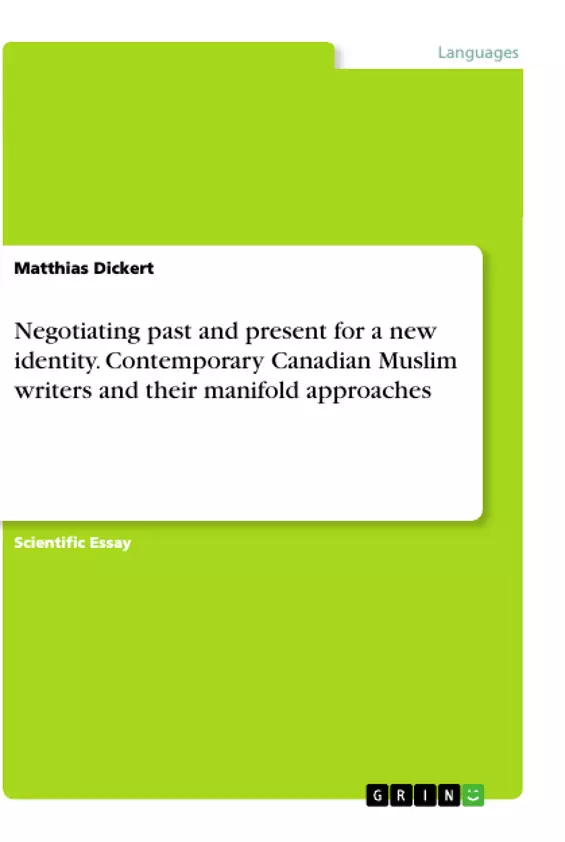This paper compares various contemporary Muslim writers from Canada and their negotiation with their identity. The choice of works tries to focus on the last decade and wants to show the multiple and flexible way these writers treat the key topic identity. All novels offer a comprehensive and detailed investigation into the concept of identity in contemporary literature from writers with a migrational background whose basis lies in the Muslim world and who know Canada since they have lived there or still do so. The generic and thematic diversity which is reflected in these books show the importance of these writers and throws light on their pluralistic concepts of identity which has and still enriches Canlit.
To better present the development of this part of Canlit the first and the last novel are discussed in more detail. The aim of this is to show the development this group of writers has made in such a short time.
Contemporary English literature investigates a wide range of issues such as theoretical and conceptual debates over modernity and contemporary, the history and practice of reviewing and / or writing in relation to nationhood, gender, religion or postcoloniality.
‘Muslim Writing’, as one branch of contemporary English literature is part of 'Postcolonial Writing’ which includes sub-genres such as the 'Postcolonial', 'Black British Writing', ‘British Jewish’ or 'British Asian'. The novelists which form 'Muslim Writing' dispose of a Muslim background which is first of all geographical and cultural and not necessarily religious. It is necessary to point this out that it is not Islam nor the religious as such which shape this term since some important writers like Salman Rushdie or (for the Canadian background Rawi Hage) are not religious in the sense that they are Muslims although India and the Lebanon dispose of a large Muslim community (in the case of Rushdie) are part of a large Muslim world (or in the case of Hage). Many of these writers such as Hanif Kureishi, Nadeem Aslam, Khaled Hosseini, Hisham Matar, Monica Ali or Anna Perera attempt to bring in this geographical, cultural or religious element by discussing and reflecting topics such as postethnicity, multiculturalism, minority, race, class, gender, religion, diaspora, community, universalism, particularism, Britishness language hybridity, belonging and above identity making. Although 'Muslim Writing' in general and 'Canadian
Inhaltsverzeichnis (Table of Contents)
- Foreword
- Introduction
- The Postcolonial background of Muslim Writing
- Canadian Muslim Writing - a short survey
- Selected Parameters
- The Background of Canadian Muslim Writing
- Close analysis of chosen examples
- Rawi Hage Cockroach (2008)
- Farzana Doctor Six Metres of Pavement (2011)
- Kamal Al-Solaylee Intolerable. A Memoir of Extremes (2012)
- Hasan Namir God in Pink (2015)
- Ausma Zehanat Khan The Unquiet Dead (2017)
- Omar el Akkad American War (2017)
- Conclusion
- Outlook Canadian Muslim Writing
- Bibliography
Zielsetzung und Themenschwerpunkte (Objectives and Key Themes)
This scientific essay examines the work of contemporary Canadian Muslim writers, focusing on their diverse approaches to negotiating identity in a postcolonial context. It explores the complex interplay between belonging and banishment experienced by these writers, drawing attention to the specific challenges and opportunities faced by Muslim writers within the Canadian literary landscape.
- The postcolonial background of Muslim writing in Canada
- Exploring the themes of belonging and banishment in contemporary Canadian Muslim literature
- Analyzing the various approaches of selected Canadian Muslim writers
- Examining the influence of cultural, religious, and political contexts on these writers' narratives
- Assessing the significance of these narratives within the larger discourse of Canadian identity
Zusammenfassung der Kapitel (Chapter Summaries)
The essay begins with a brief overview of the evolving definitions of "Contemporary English literature" and its subgenres, specifically highlighting the emergence of "Muslim Writing" as part of the broader "Postcolonial Writing" movement. The essay then provides a concise survey of Canadian Muslim writing, followed by an in-depth analysis of selected works, examining their unique literary approaches to navigating identity, belonging, and banishment within a Canadian context.
Schlüsselwörter (Keywords)
This essay focuses on the intersection of "contemporary English literature", "postcolonial writing", "Canadian Muslim writing", "identity", "belonging", and "banishment" within the context of the Canadian literary landscape.
Frequently Asked Questions
What is meant by 'Muslim Writing' in Canadian literature?
It refers to works by writers with a Muslim geographical and cultural background, regardless of whether the authors are personally religious.
What are the key themes of these contemporary Canadian novels?
The novels primarily explore identity, belonging, banishment, multiculturalism, and the negotiation between past and present in a postcolonial context.
Which writers are analyzed in this paper?
The analysis includes Rawi Hage, Farzana Doctor, Kamal Al-Solaylee, Hasan Namir, Ausma Zehanat Khan, and Omar el Akkad.
How do these writers contribute to 'Canlit'?
They enrich Canadian literature with pluralistic concepts of identity and diverse perspectives on what it means to be Canadian in a globalized world.
What is the focus of Rawi Hage's 'Cockroach'?
The novel is analyzed for its portrayal of the immigrant experience and the complex psychological negotiation of identity and survival.
- Citation du texte
- Dr. Matthias Dickert (Auteur), 2020, Negotiating past and present for a new identity. Contemporary Canadian Muslim writers and their manifold approaches, Munich, GRIN Verlag, https://www.grin.com/document/950584



